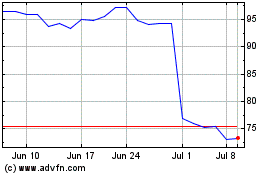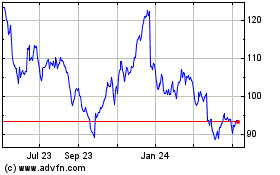By Stella Yifan Xie and Julie Wernau
In recent months, Chinese officials have had to contend with a
bruising U.S. trade war, a slowing economy and crippling outbreaks
of African swine fever.
Add to those threats to order and prosperity a financial bubble
in high-end sneakers.
"Trading sneakers is not so different from trading stocks," said
Wang Zhichen, a 32-year-old client manager at a Shanghai
mobile-payments firm, who checks prices on Nice and Poizon, two
widely used Chinese sneaker-trading platforms, as soon as he wakes
up. He then adjusts the prices of shoes he intends to sell to a
clientele of 700-plus potential buyers via Chinese all-purpose app
WeChat. "You need to watch the opening and closing prices."
Chinese sneaker mania has gone into hyperdrive, taking the U.S.
subculture and its obsession with the first Air Jordans to a new
level. Speculators are flooding trading platforms and treating
sneakers much like financial derivatives, including buying and
selling shoe fractions.
It's all getting a bit much for the People's Bank of China,
whose Shanghai branch recently warned financial agencies in the
city of sneaker-frenzy risk, including "mass disturbances,"
according to state media reports and a document seen by The Wall
Street Journal.
Chinese investors are on a perpetual search for the next big
thing and tend to pile into anything hot, such as bitcoin or
garlic, which saw fortyfold price rises in some parts of the
country in 2009.
Such feeding frenzies rarely end well. The past month exposed
another one -- certificates purportedly exchangeable for crabs, a
popular food during China's weeklong October holiday. An avalanche
of what were essentially crab futures ended up leaving many buyers
with neither crabs nor money.
Sneaker trading platforms were set up partly to help buyers
verify shoes' condition and weed out fakes, much like similar
platforms in the U.S.
In China, however, speculators exploited a 30-minute time lag in
which both buyers and sellers can opt out of a trade without
penalty, using multiple accounts to cancel trades and make new bids
in a rapid-fire sequence that creates an illusion of hot demand,
sometimes tripling the price of a shoe in half an hour.
Some use a "warehouse" option to buy and sell shoes without ever
taking delivery of the actual item. Others trade on fractions of
shoes, represented by a token, through cryptocurrency exchanges
such as 55.com.
Trading platforms are plugging some of the loopholes by forcing
buyers of already-inspected sneakers to take delivery of them
before they can sell them again. It isn't clear that is helping
much.
On trading platform Nice, a pair of Travis Scott Nike Air Force
1s is set to go on sale on Nov. 4 for around $170. Two buyers have
already bought rights, similar to a call option, to buy the shoes
for $1,553 and $2,667, respectively, and more than 2,000 users have
said they are generally interested. More than 800 buyers are
offering between $295 and $700 for a pair of Air Jordans set for
release on Nov. 5 at $183.
Nice and Poizon didn't respond to requests for comment. Nike
declined to comment.
A government crackdown would be bad news for Yang Lei, 25. The
telecom-company employee started trading shoes with a pair of "Bugs
Bunny" Air Jordans he sold for a more than $100 profit on Nice.
With 24 pairs now in his portfolio, he isn't worried his
investment will depreciate. "Everyone just thinks he won't be the
last to pick up the hot potato." He figures if he sold all his
shoes now, his profit would be around $3,500.
On that principle -- that a rising price will keep rising --
even nonsneaker items are getting swept up in rallies. On Nice in
September, a 70 cent IKEA keychain saw its value soar to more than
$140, and a paratrooper toy given away free in a store-chain
promotion sold for as much as $282.
The frenzy is creating distance between true sneakerheads and
sneaker speculators.
One of Liu Yuan's most beloved pairs, Nike's SB Dunk High Pro
Dog Walkers, feature a colorful mix of faux dog fur. He thinks they
represent Afghans, Golden Retrievers, German shepherds and
Dalmatians. On the soles are a collage of dog photos. When the
shoes arrived, the dark brown shoelaces came folded like dog feces
in a plastic bag.
Mr. Liu, 23, who works in branding at a Shanghai sports firm,
bought the pair in July for around $212 on the Nice platform. They
now trade for $310, a near 50% premium.
That is not enough for Mr. Liu to sell. "When I wear these
sneakers to work, my colleagues always say I look hip," he
said.
Guan Tian, 25, runs a high-end sneaker store in Beijing's
upscale Sanlitun neighborhood with friends and displays his
personal collections there. Surrounded by shrink-wrapped Nike
sneakers behind plexiglass, he said the sneaker bubble has driven
up prices for the true aficionados. A few years ago, fans could
line up outside stores for new releases, while now they are
selected mostly by online lotteries.
That has also made it harder for traders to secure fresh supply
at release prices. To increase his chances in a lottery on Nike's
official website, Mr. Wang hired a company that uses registration
bots.
On a recent Saturday, he and a few fellow traders staked out two
Nike stores in Shanghai for 18 hours, with just a break for lunch.
They circled buyers who had just paid around $180 for a pair of
dark gray Air Jordan 6s, a limited edition designed by rapper
Travis Scott, offering them more than $1,000.
For those taking the offer, Mr. Wang demanded to see the store
receipt to guard against buying a fake pair. "Unlike stocks, there
are no regulators in this market," he said,
--Raffaele Huang contributed to this article.
Write to Stella Yifan Xie at stella.xie@wsj.com and Julie Wernau
at Julie.Wernau@wsj.com
(END) Dow Jones Newswires
October 27, 2019 13:08 ET (17:08 GMT)
Copyright (c) 2019 Dow Jones & Company, Inc.
Nike (NYSE:NKE)
Historical Stock Chart
From Mar 2024 to Apr 2024

Nike (NYSE:NKE)
Historical Stock Chart
From Apr 2023 to Apr 2024
